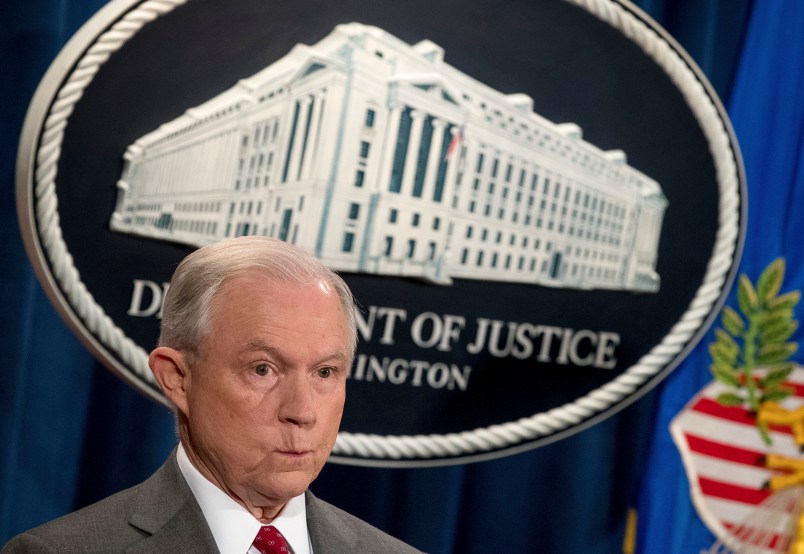The Justice Department on Tuesday waded into the debate over free speech on college campuses, filing a statement of interest on behalf of an evangelical Christian student who sued his Georgia university over alleged First Amendment violations.
Attorney General Jeff Sessions announced the DOJ’s statement in the case during an address promoting campus free speech at Georgetown University Law Center, telling the small, invitation-only crowd that his agency would “enforce federal law, defend free speech, and protect students’ free expression from whatever end of the political spectrum it may come.”
As he spoke, faculty and students who were denied entry to the event protested outside, some with tape placed over their mouths.
Sessions made clear Tuesday that the interest in the evangelical student’s case was just the start of the DOJ’s newly-launched campus free speech crusade, promising that his department would be weighing in on more cases “in the weeks and months to come.”
The renewed commitment begins at a particularly charged moment in the national debate over free speech. Students have organized mass protests to keep certain controversial speakers from addressing their peers, and those speakers have capitalized on the contention to secure media attention in turn.
One such speaker is white nationalist leader Richard Spencer, who has enlisted the help of Georgia State University grad student Cameron Padgett to manage his speaking tour of college campuses across the country. Padgett has sued Michigan State University on First Amendment grounds for refusing to allow Spencer to come speak, after successfully suing Auburn University to allow Spencer to speak there.
National attention is likely to be trained on how the case that drew the DOJ’s interest, Uzuegbunam v. Preczewski, plays out given the Attorney General and other Trump administration officials‘ recent remarks on the subject of free speech.
At issue in Uzuegbunam v. Preczewski is Georgia Gwinnett College’s use of two “free speech expression areas,” which are made available to students for a total of 18 hours a week. Student Chike Uzuegbunam filed suit in U.S. District Court in Atlanta in December, charging that school officials had violated his First Amendment rights by telling him to stop preaching his evangelical beliefs and distributing fliers about his faith within one of those zones. Officials allegedly told him that his evangelizing amounted to “disturbing the peace” because a number of students had complained about his comments, according to court documents.
The Alliance Defending Freedom, a conservative Christian nonprofit representing Uzuegbunam, has argued that this stance violates both the student’s First and Fourteenth Amendment rights. The DOJ concurred in its statement of interest, pointing to decades of court precedent falling strongly in favor of strong free speech protections in public spaces like state university campuses.
“Colleges and universities must protect free speech and may not discriminate out of a concern that listeners might find the content of speech offensive or uncomfortable,” the statement reads, noting that there is a heightened interest in this case because of the “allegations of disparate treatment based on religion.”
U.S. Judge Eleanor Ross is currently considering a motion to dismiss the case filed by Georgia Gwinnett College.
Read the DOJ’s full statement of interest in Uzuegbunam v. Preczewski below:







The Sessions Political Spectrum™:
White KKK member <—> White Neonazi ↔ White alt.right blogger ↔ White Republican
When I was grad student at the University of Michigan 35 years ago, there were regularly guys on soapboxes going on about Christ. A few people at any one time would stop to watch and then walk on. Nobody’s feathers were ruffled.
If Richard Spencer wants to speak then he needs to post a security deposit. If there are no damages (physical) he gets his deposit back. He is then safe to say anything he wants but he will be responsible for consequences of his messaging.
As long as the gentleman isn’t forcing people to take fliers and sticks to his alloted space. I don’t see a problem, and I am an agostic. Of course, others are free to shout, “bollocks” at him.
No information is given about the nature of the complaints and the line drawn between being made uncomfortable and hate speech is often tenuous. Was the gentlemen advocating against LGBT? We’re not told.
And I’m assuming that a Muslim member of the student body who wishes to likewise harange his (it’s almost always his) non-captive audience about the many joys of fundamentalist Islam and the apostacy of the infidels as well and the innate degenerate state of America would be likewise allowed to freely do so.
“…like football stadiums during the national anthem.”